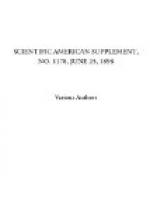Usually the writers in the English tongue prefer a different basis than any of these which I have mentioned; they prefer the basis as to whence is derived the food supply of a nation, or a tribe; and on the source of that food supply they divide nations and tribes into the more or less cultured. In earliest times (and among the rudest tribes to-day) the food supply is furnished entirely by natural means; there is little or no agriculture known to speak of; there is nothing in the way of preserving domestic animals for food; hunting the wild beasts of the forests and fishing in the streams are the two sources. Therefore, we call that last condition the hunting and fishing stage of human development. You will observe that when that prevails there can be no congregation of men into large bodies. Such a thing as a city would be unknown. The food supply is eminently precarious. It depends upon the season and upon a thousand matters not under the control of man in any way. Moreover, inasmuch as the supply at the best is uncertain, it allows but a very limited population in a district; nor does it permit any permanent or stable inhabitations. The towns, such as they are, must be movable; they must go to one part of the country in the summer and another in the winter; they must follow the game and the fruits; and in that condition, therefore, of unstable life it is not possible for a nation or a tribe to gain any great advance. You observe, therefore, that when the food supply is drawn from this source it does entail a general depravity of culture everywhere.
Above that would come the food supply which is obtained from other sources. There is one which is not universal but still widely extended, and that is the pastoral life. There are many tribes (as, for instance, in southern Africa and in India and throughout the steppes of Tartary and elsewhere) who live on their herds and drive their herds from one pasture to another in order to obtain the best forage. This nomadic and pastoral life extended very widely over the old world in ancient times, but existed nowhere in the new world, for the simple reason that they had no domesticated animals. Our own remote ancestors—both the Aryans and the Semites—all the early ancestors of the white race so far as known, were pastoral or nomadic; and the Aryans of central Europe remained so until after the fall of Rome, when, for the first time, they became practically sedentary. This nomadic and pastoral life is a very great advance over the mere hunting and fishing stage. It requires considerable care and attention to domesticate the wild animals in any sufficient quantity to form a reliable source of food. Moreover, the attention which it was necessary to give to the rearing and training and the looking after domestic animals was to a certain extent, humanizing. When a man found that it was necessary to be careful about his animals, he would also be careful about his neighbors. We would say that the same sense which enabled him,




